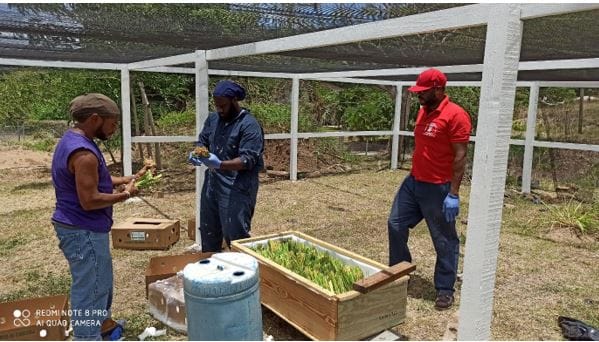
| The Inter-American Institute for Cooperation on Agriculture (IICA) and the Caribbean Biodiversity Fund (CBF) Ecosystem-based Adaptation (EbA) project hit a milestone, the first-time export of vetiver grass. The project “Strengthening Coastal and Marine Climate Resilience through Upland and Coastal Ecosystem Based Adaptation and Community Engagement”, is supporting climate change adaptation and poverty alleviation in Antigua and Barbuda, Dominica, Saint Lucia, and Tobago. It is funded under the CBF EbA Facility, financed by the Government of Germany, German Development Bank (KfW) with resources from the International Climate Initiative (IKI) of the German Ministry of the Environment, Nature Conservation and Nuclear Safety.
Vetiver is seen as a green engineering solution to climate change. It is typical to Dominica, with farmers maintaining hedgerows in their fields, communities and around their homes to control water flow and soil erosion. Farmers as well as several communities in Antigua and Barbuda are affected by soil erosion during adverse weather conditions (flooding) and will benefit from this intervention. Other beneficiaries will be the Arts and Craft entrepreneurs who will benefit from using alternative materials use to weave the baskets, mats and other crafts.
Antigua has no significant sources of vetiver, hence the supply from Dominica. Under the project, the IICA Delegations and Ministries of Agriculture Plant Protection Units in Antigua and Dominica coordinated a process to complete a Pest Risk Assessment (PRA), a first for the Region. Craig M. Thomas of IICA Antigua and Barbuda, coordinated the process of importation of the grass upon arrival to Antigua and Barbuda. In Antigua and Barbuda, the EbA project is being implemented in the Cooks Landfill, where the leaching of hazardous chemicals and waste is affecting the marine and biodiversity life for one of the largest mangrove swamps in Antigua and Barbuda which indirectly affects the livelihoods for some local persons within the surrounding communities. These communities and their ecosystems are extremely vulnerable to climate change and adaption, including mainstreaming grassroots EbA solutions, will be important to building their environmental, economic, and social resilience. This is in keeping with Antigua and Barbuda’s resilient programmes to transform the country to build national capacity centred around identifying mitigation measures; promoting public awareness; and preparing the initial national communications document. Mr. Thomas acknowledged the full and hands-on support of the Caribbean Agriculture Research Development Institute (CARDI) the Ministry of Agriculture, Fisheries and Barbuda Affairs (MoAFBA) in facilitating the technical support and the phytosanitary requirements for clearing the packages from the shipment on June 2nd. This is the first batch of 2,100 vetiver grass slips of a total of 6500 be imported to Antigua under the project brand ‘Vetiver4lavie’ (i.e., vetiver for life). The planting materials will be quarantine at the main nursery for the Forestry Unit where they will be monitored and evaluated before transplanted to the two designated propagation nurseries located in the Forestry Unit Nursery and the other at the GARD Center for a rapid propagation to supply approximately 35,000-45,000 grass for green engineering soil and land amelioration/rehabilitation solutions in the Cooks Landfill and training of young persons in vetiver handicraft as viable green business livelihoods within the next 4-6 months. |
Advertise with the mоѕt vіѕіtеd nеwѕ ѕіtе іn Antigua!
We offer fully customizable and flexible digital marketing packages.
Contact us at [email protected]















This is good news. Let’s do it.
Comments are closed.